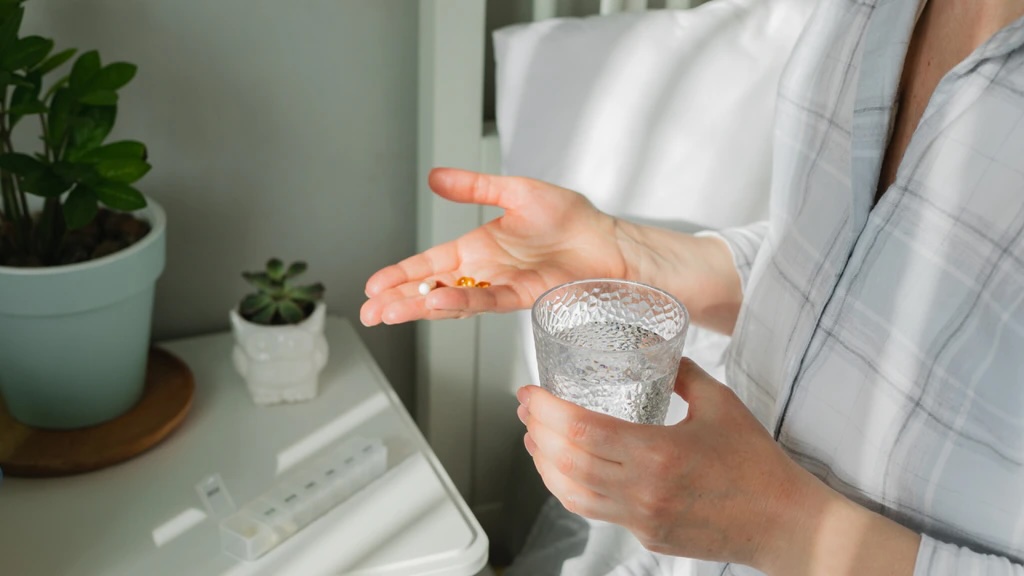
Magnesium might be your secret to a good night’s sleep. Image: Getty
If you find you’re struggling to fall asleep – and stay asleep – a magnesium supplement may help, according to Body+Soul sleep expert, Olivia Arezzolo.
For the uninitiated, magnesium is one of the most important minerals for our bodies, found in numerous foods such as vegetables, whole grains and nuts. The only problem is, most of us don’t get adequate amounts from our diets.
With several benefits including improving sleep quality and helping to relieve anxiety, muscle cramps, and constipation, it works by targeting the muscles in our bodies and brains, leading many people to up their levels with a supplement.
However, all magnesium is not the same. Some forms are more beneficial for sleep, and others, are less so. Magnesium is available in various different forms including supplements and skincare, making it all the more confusing when it comes to choosing the best product.
How can magnesium improve sleep?
Magnesium relaxes the muscles – mind and body alike. As a result, we can feel less anxious, less stressed and sleep better. As noted in a recent study report, magnesium can reduce anxiety by 31 per cent over a four-week period.
In a similar vein, a systematic review found magnesium to positively correlate with multiple aspects of sleep: sleep quality overall, duration, fatigue and the likelihood of falling asleep through the day.
As you may suspect, higher levels of magnesium improved sleep and reduced fatigue, whereas lower levels of magnesium were associated with greater daytime fatigue, poorer sleep quality and less sleep overall.
What are some magnesium-rich foods?
Of course, having a magnesium-rich diet will be helpful – supplementing or not. Seeds such as pumpkin seeds and chia seeds are abundant in magnesium, as are nuts like almonds, cashews and peanuts. Leafy green veggies are also great, with the standout being spinach and whole grains such as rolled oats. Essentially, nuts, seeds, leafy greens and whole grains are all good go-to options.

Stock-up on leafy greens in your next shop. Image: Getty
Do we get enough magnesium in our diet?
Many of us do not. According to the Australian Bureau of Statistics, 61 per cent of males between 14-18 do not have enough magnesium in their diet, and neither do 72 per cent of females of the same age.
As we emerge into adulthood, our stats improve temporarily – 34 per cent of males and 37 per cent of females 19-30 don’t consume enough magnesium, however by the time we are over 71, 64 per cent of males and 49 per cent of older adults have insufficient levels of this critical micronutrient.
However, it should be known: even with a magnesium-rich diet, we can still struggle to get enough magnesium. This is in part due to commercial farming as it has depleted many minerals from our soils, with magnesium being one. Another factor is poor gut function, something faced by many. This can reduce the capacity of the gut to absorb micronutrients, such as magnesium.
What form is best: oral supplements or topical?
Both are effective, and it can depend on your specific circumstances. For example, if you have gut issues, perhaps topical is better for you. On the other hand, if you have sensitive skin, then oral may be best suited to you. With both being effective, it largely comes down to your personal circumstances, and what you prefer.
What magnesium form is best for sleep?
Clinical evidence indicates magnesium glycinate is best for sleep, promoting sleep quality, efficiency and depth alike. Note magnesium biglycinate is equally as effective – the two forms are exactly the same, the only difference being that magnesium biglycinate is technically the correct name, considering its chemical structure.
Originally featured on Body and Soul
+ show Comments
- Hide Comments
add a comment